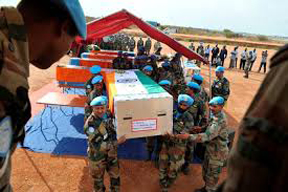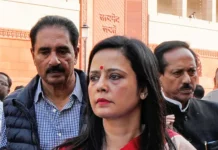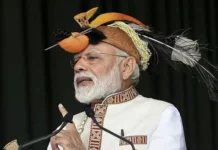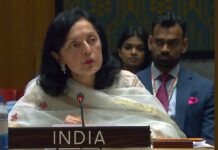 UNITED NATIONS: The United Nations honored 106 peacekeepers, including eight Indian soldiers, who lost their lives in peacekeeping operations, even as India stressed that the Security Council should act to restore political situation in troubled nations as peacekeeping is not the solution to instability in such countries.
UNITED NATIONS: The United Nations honored 106 peacekeepers, including eight Indian soldiers, who lost their lives in peacekeeping operations, even as India stressed that the Security Council should act to restore political situation in troubled nations as peacekeeping is not the solution to instability in such countries.
The International Day of UN Peacekeepers was commemorated here yesterday with UN Secretary General Ban Ki-moon laying a wreath at a newly-created memorial for the peacekeepers.
The ceremony was attended by India’s Permanent Representative to the UN Ambassador Asoke Kumar Mukerji and other envoys and military attaches of member states.
Ban then presided over a solemn ceremony where the prestigious Dag Hammarskjold Medal, named after the second UN chief, was posthumously awarded to the 106 fallen peacekeepers for their courage and sacrifice in the line of duty.
Mukerji accepted the medal on behalf of the eight Indian soldiers who lost their lives while stationed at UN missions.
The fallen Indian peacekeepers are Lt Col Mahipal Singh, Lance Naik Nand Kishore Joshi, Havildar Heera Lal, Naib Subedar Shiv Kumar Pal and Havildar Bharat Sasmal from the UN Mission in South Sudan (UNMISS) who were killed in April last year when they were ambushed by about 200 attackers near Jonglei State as they escorted a UN convoy.
Subedar Dharmesh Sangwan and Subedar Kumar Pal Singh died in action in December last year in Akobo following an assault on a UN base. Sepoy Rameshwar Singh, deployed as a peacekeeper in the UN Organization Stabilization Mission in the Democratic Republic of the Congo, was killed in February 2013.
Mukerji later hosted a commemorative reception where the names of all the 106 peacekeepers were placed along with photographs of the eight Indian soldiers who had died.
The symbolic tribute, an initiative by India and a first, was made to honor those who collectively gave their lives in pursuit of international peace and security.
Candles were lit in their memory to demonstrate the solidarity of the UN peacekeeping community and the debt owed by the international community to the brave souls.
Noting that peacekeepers are increasingly being caught up in internal conflicts in troubled nations, Mukerji expressed concern that peacekeepers are often perceived as acting in a “partisan manner” on behalf of the government against the opposition.
“This is source of concern and source of threat to peacekeepers,” he told PTI.
He said peacekeeping is not the solution to political instability inside member states and the UNSC “must actually act to prevent and restore the political situation on the basis of which the peacekeeping mandate was given. Mukerji stressed that the UNSC must give priority to the political aspect after which peacekeeping can play a role.
“But right now peacekeeping is being asked to play the primary role and the political aspect is not being emphasized at all. That is something we are very concerned about.”
Mukerji also stressed that the Council should invite and consult those member states who are contributing troops to the UN peacekeeping missions before the 15-nation body formulates or alters the peacekeeping mandates.
India is the single largest troop contributor to the UN mission in South Sudan but Mukerji said: “to date, including with the South Sudan resolution, we have never been called by the Security Council. We do not mind having discussions with the UN Secretariat” but the Charter requires member states contributing troops to be consulted by the Council on how the mandate is formulated and even altered.
Earlier, during the wreath-laying ceremony, Ban hailed the “long and proud” history of United Nations peacekeeping and said the military, police and civilian personnel “at great personal risk help stabilize communities, protect civilians, promote the rule of law and advance human rights.”
The UN Secretary General oversaw the wreath-laying at the memorial for the very first time.
The proposal for this commemoration had been made by India, supported by several other UN member states in the Peacekeeping Committee meeting and endorsed by the Fifth Committee of the UN General Assembly last year.
“We mourn the passing of every one of these courageous individuals. We grieve with their friends and families and we recommit ourselves to ensure that their contributions to the cause of peace will never be forgotten,” Ban said.
He noted that currently over 116,000 UN personnel from more than 120 countries serve in 16 peacekeeping operations.
“We applaud the courage, dedication and professionalism of the 120,000 peacekeepers who are now deployed in some of the most dangerous places on earth. I pay them my highest tribute,” said the UN chief.
In his remarks at the Dag Hammarskjold Medal Awards Ceremony, Under-Secretary-General for UN Peacekeeping Operations Herve Ladsous said the blue helmets that had lost their lives had not perished merely for an ideal – “Our peacekeepers have made a practical difference on the ground, and this perhaps what matters most.”
India has been among the largest troop contributors to UN peacekeeping operations. It has contributed more than 170,000 troops to 43 of the 68 UN peacekeeping missions since the inception of UN peacekeeping more than 60 years ago.
Currently, a total of 8,132 Indian soldiers are deployed in 10 critical UN peacekeeping missions across the world including 429 in Haiti, 4,034 in Congo, 193 in Golan Heights, 894 in Lebanon, 250 in Liberia and eight in Cote d’Ivoire. –PTI






